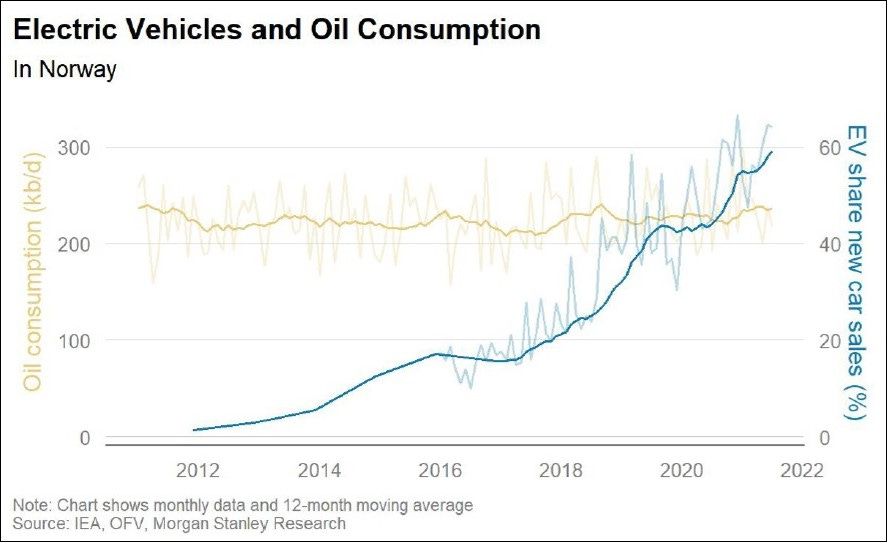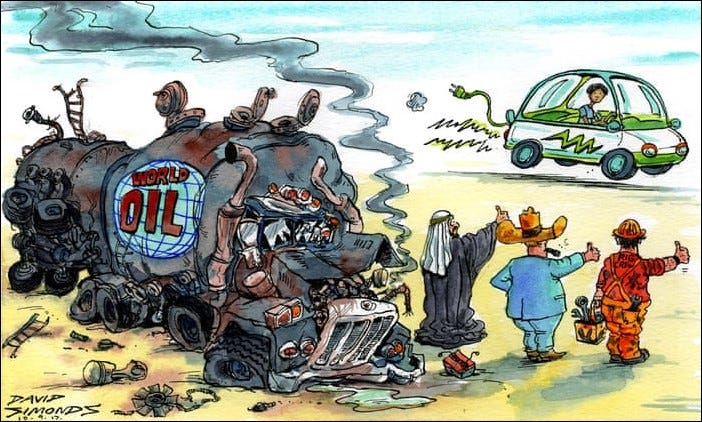Poking Holes in the Narrative that Electric Vehicles Spell The End of Oil
the Plug #24 | On Electric Vehicle Adoption
Simplism: The act or an instance of oversimplifying. Especially, the reduction of a problem to a false simplicity by ignoring complicating factors.
The presence of energy in our day-to-day lives is mostly invisible.
At the flick of a switch, we have light. And with the turn of a thermostat, we have heat.
Rarely, if ever, do we pause to consider the incredible complexity of the systems behind these mundane, everyday activities. For most people, there is no obligation or benefit to understanding the complex world of energy.
So why bother?
Our primary interaction with natural gas and electricity systems occurs when we receive our monthly utility bills. Fortunately, the cost of these energy bills is relatively predictable, allowing us to (mostly) avoid giving them a second thought. Thanks to the convenience of automated payment, even that process is becoming increasingly invisible.
The incredible user-friendliness of our energy system makes it easy to take its intricacy for granted.
Like natural gas and electricity, the oil industry has a comparably invisible influence on society — albeit with one notable exception. Each time we take a trip to the gas station, we are reminded of oil's role in facilitating our mobility.
The two or three minutes spent pumping gasoline into our cars on a weekly or biweekly basis provides plenty of opportunities to contemplate our reliance on crude oil. The necessity to regularly refill our vehicles with gasoline is a rare example of a circumstance in which our energy system is visible to most of the population.
Because gasoline prices have an outsized impact on our budgets, it is also a consistently contentious issue. As a result, the relationship between gasoline and passenger transport is commonly used both as a political football and as one of the media's favourite talking points.
But away from the gas station, there is no need to consider what happens after crude oil gets pulled from the ground.
Given that our only consistent interaction with the oil industry is at the pump, it seems natural to assume that passenger vehicles represent a significant source of oil demand. That assumption also implies that the growing adoption of electric vehicles spells the beginning of the end for global oil consumption.
If only it were so simple!
Norway is Winning the EV Space Race
In recent years, Norway has become the undisputed world leader in electric vehicle (EV) adoption. To prove my point:
Norway sold the highest share of plug-in EVs (as a % of total new car sales) of any country globally in 2018, 2019 and 2020
Norweigan EV sales in 2020 (as a % of total new car sales) were ~30% higher than in Iceland, the country which finished second
Norway has soft-targeted phasing out the sale of internal combustion engines (ICEs) in passenger vehicles by 2025; I believe this to be the most aggressive target of any country globally
.
There's an interesting chicken and egg problem to solve for many of the clean energy technologies endeavouring to build scale in the decades to come. In the case of EVs, for example, what should come first: the cars or the charging infrastructure?
This dilemma complicates the scale-up of most decarbonization technologies. Especially given the need to replace existing, established infrastructure.
So far, Norway seems to have most effectively cracked that egg code for EVs.
Over the past decade, the country's progress in decarbonizing its passenger vehicle fleet by transitioning it over to electricity is genuinely remarkable.
Annual new vehicle sales of "diesel-only" cars plummeted from ~76% of total sales in 2011 to only ~9% in 2020
Concurrently, electric vehicle sales exploded, rising from ~2% to ~54% of new vehicle sales
Plug-in hybrids also gained ~20% market share during that time

Norway's blistering pace of EV adoption has paved a road for the rest of the world to follow. The country's successes and failures will serve as case studies for other countries striving to decarbonize their passenger vehicle fleet.
To recap the situation in Norway:
EV sales have gone through the roof over the past decade
Diesel-powered vehicles are quickly going the way of the dinosaur
.
Naturally, one could assume that over the past decade Norwegian oil demand has concurrently declined, right?
Wrong!
An Oily Electrification
From 2010 through 2020, Norway's oil demand has stayed surprisingly constant.
In each year over the past decade, the country's daily oil consumption has averaged somewhere in the range of 210,000 to 240,000 barrels per day (bpd). In 2020, that figure sat at ~230,000 bpd. Some of that oil was pumped into the diesel-guzzling passenger vehicles that persist on Norway's roads today.
But most of it was consumed by a variety of other sources.

Wait, what?!
According to JPMorgan, there are three main explanations for the contradiction of Norway's unchanging domestic oil consumption, amidst the rise in EV adoption.
Passenger vehicles make up only 20-25% of total oil demand
The turnover in Norway's car fleet (i.e. the replacement of ICEs) is happening gradually
New vehicle sales for diesel trucks & vans have grown over the past decade
.
Unfortunately, despite Norway's success in mass EV adoption, the country has not shown any real progress in reducing domestic oil demand.
I found this quite surprising.
A Crude Reality
There are so many different commodities that play significant roles in our lives. But, for the most part, I (alongside most people, I assume) know relatively little about them.
Corn, diamonds, lumber, steel, and gold, to name only a few.
It’s interesting to reflect on the misconceptions and blind spots we have as a society due to our blissful ignorance surrounding key commodities. As it pertains to our energy industry, I believe those misconceptions are plentiful.
Despite my understanding of the energy industry, I was taken aback by the reality of Norway's energy market. I believe it's because I disproportionately assumed that passenger transportation drives oil demand. That seemed like a safe assumption, given that everything in my daily experience points to that reality.
And yet, as the Norwegian case study so clearly highlights, that perspective seems to have been a gross oversimplification. Instead, it would appear that oil demand will likely persist well beyond the sale of the world's last internal combustion engine.
Whenever that may be…
EV adoption will undoubtedly play a role in reducing the world's dependence on crude oil. But relative to heavy industries, where replacing our reliance on oil byproducts will be a much heavier lift, the electrification of passenger transport is relatively low-hanging fruit.
As is often the case in matters involving our energy systems, the challenge we're facing in the pursuit of decarbonization will be incredibly complex and challenging.
Even if we as human beings so badly wish for (and at times expect) simplicity.





I think you could have done a proper job by actually studying what DOES drive oil demand.
As an example plastics are a derivative of oil, the fact is that distilling petroleum products will leave you with a range of products. Petrol and diesel, kerosene, etc. Will still be produced but if demand is less then price will be less, resulting in less cost of ownership of future ICE vehicles.